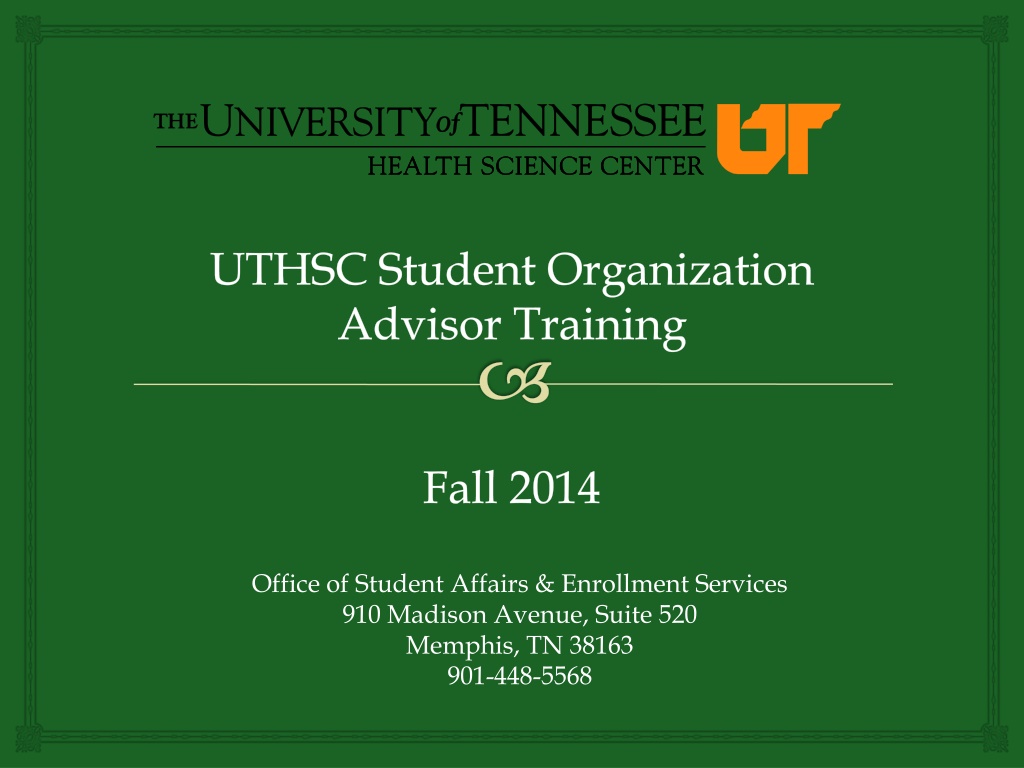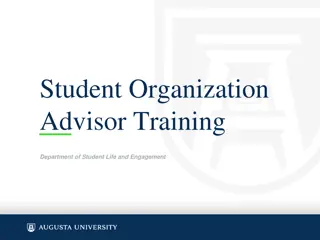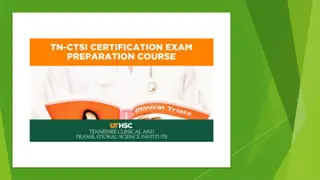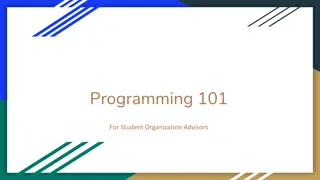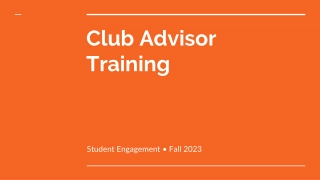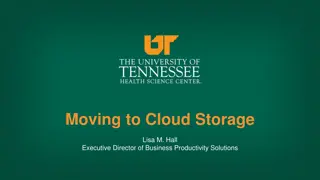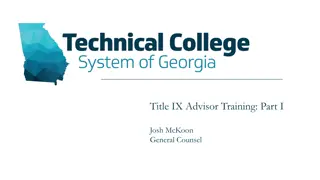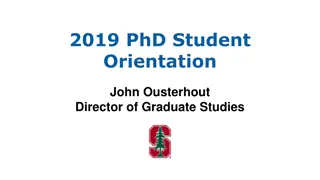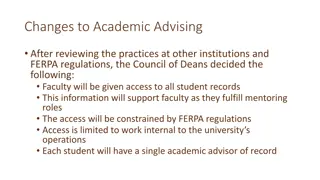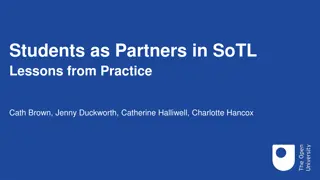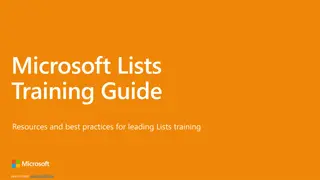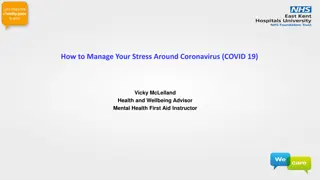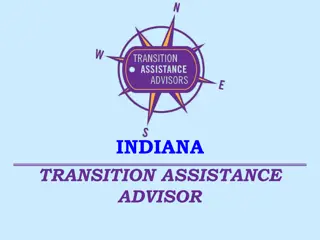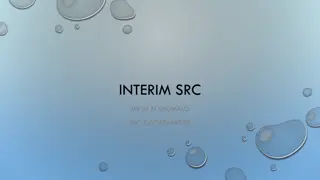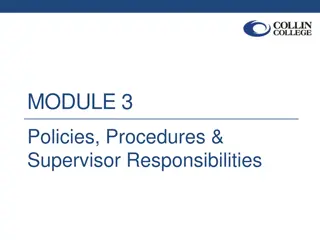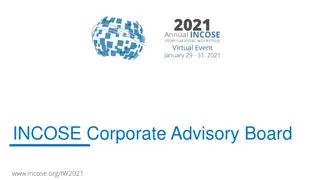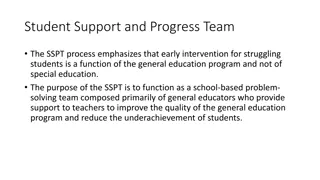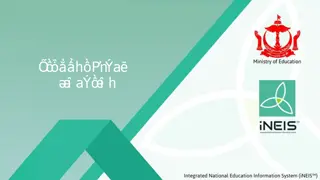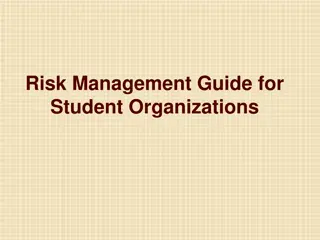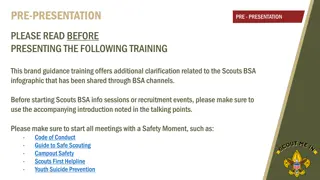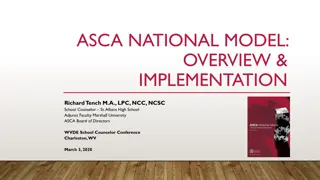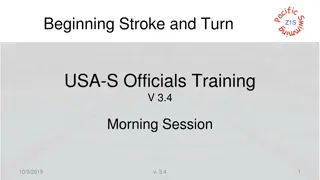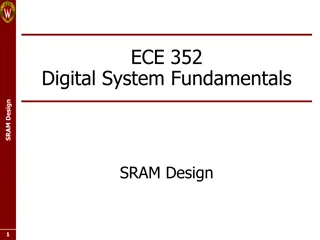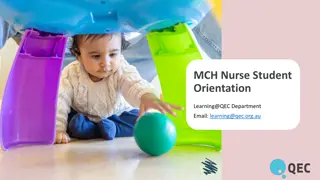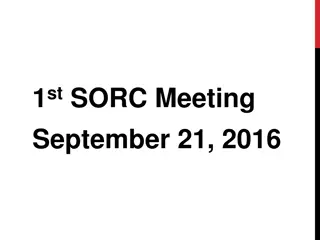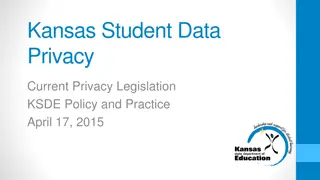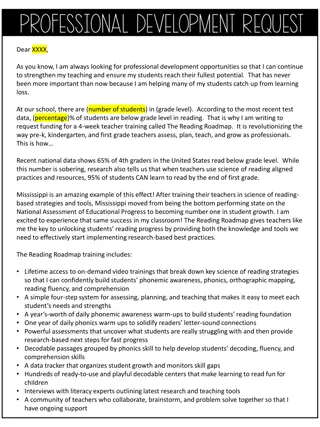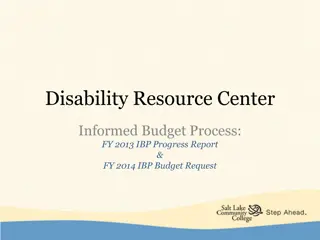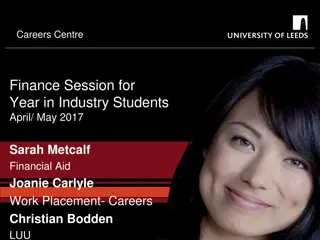UTHSC Student Organization Advisor Training Overview
UTHSC Student Organization Advisor Training provides guidance for student organizations on policies, procedures, and leadership development. Learn about becoming an approved organization, recognition process, advisor roles, and commitment involved. Advisors play a crucial role in supporting student organizations and fostering leadership skills among members.
Download Presentation

Please find below an Image/Link to download the presentation.
The content on the website is provided AS IS for your information and personal use only. It may not be sold, licensed, or shared on other websites without obtaining consent from the author. Download presentation by click this link. If you encounter any issues during the download, it is possible that the publisher has removed the file from their server.
E N D
Presentation Transcript
UTHSC Student Organization Advisor Training Fall 2014 Office of Student Affairs & Enrollment Services 910 Madison Avenue, Suite 520 Memphis, TN 38163 901-448-5568
Student Activities and Involvement The Offices of Student Life and Student Affairs and Enrollment Services are committed to providing student organizations with guidance related to policies, operational procedures, and various opportunities to develop leadership skills. Faculty and Staff advisors are the primary contact at UTHSC for student organizations. The Office of Student Life serves as a liaison, with the SGAEC, in support of student organizations. Staff within the Office of Student Life, and the Vice Chancellor for Academic, Faculty and Student Affairs advise and work closely with the Student Government Association Executive Council (SGAEC).
Becoming An Approved Organization Any association of students wishing official recognition as a student organization must submit an application for approval by the SGAEC (Student Government Association Executive Council). See CenterScope, at www.uthsc.edu/centerscope. The SGAEC may recommend recognition to the Office of Student Life. The Office of Student Life will advise, in writing, the student organization seeking recognition within seven (7) business days, whether or not the recommendation is approved. A non-affirmative decision may be appealed to the Vice Chancellor for Academic, Faculty and Student Affairs. The Vice Chancellor for Academic, Faculty and Student Affairs will review the appeal and advise the Office of Student Life of his/her decision.
Student Organization Recognition Formation A. Procedure B. Constitution C. Purpose D. Size & Continuity E.Membership & Records F. Officers G. Advisor Identification
Advisor Roles What is an advisor? A UTHSC student organization advisor is a dedicated faculty or staff member who is requested or appointed to provide guidance and support to officers and members of a student organization. The advisor will serve as a representative of the organization in an official capacity, as well as an advocate for members. Why serve as an advisor? Advising student organizations provides students with an opportunity to engage with expert healthcare professionals on campus and engage in mentorship to develop their leadership skills. It also furthers one s commitment to service and the holistic development of students. Role model Sounding board Guidance related to policies Provide continuity Connect with campus resources Mentor (Adapted from the University of Florida, October 2, 2014; https://www.studentinvolvement.ufl.edu/Portals/1/Student%20Organizations/Student%20Org%20Resources/Student%20Org%20Handbook% 202013-2014.pdf)
Time Commitment The amount of time required to serve as a student organization advisor varies based on the needs of that organization. The average advisor can spend two to three hours a month with an organization. If your organization is more active, advisors can spend two to four hours per week. Advisor activities can include: Ensuring election of new officers Regular contact with officers and members Review of checking account procedures and expenditures Attending meetings Programming and activity review and approval Liaison with the campus and surrounding community Attending various events sponsored by the student organization you advise Meeting with president(s), or officers of the student organization to discuss event programming, organizational development and reflection Approving fundraising activities (Adapted from the University of Florida, October 2, 2014; https://www.studentinvolvement.ufl.edu/Portals/1/Student%20Organizations/Student%20Org%20Resources/Student%20Org%20Han dbook%202013-2014.pdf)
Faculty/Staff Advisor Form Faculty/Staff Student Organization Advisors must sign and date the Responsibilities of Faculty/Staff Advisors to Student Organizations Form. Before the organization can receive official recognition at UTHSC, the form must be submitted to the Office of Student Life. In some organizations, the advisor duties may be shared by multiple advisors. Only the advisor of record is required to complete and submit the form. However, it is recommended that each advisor completes and submits the form. Questions as to the duties of faculty advisors should be directed to College level Deans, College Student Affairs Dean/Staff, or the Associate Vice Chancellor for Student Affairs. In addition, please review the student organization information in CenterScope, and on the Student Life website.
Inappropriate vs. Appropriate Advising Actions Appropriate Actions Serving as a resource to the organization Sharing specific knowledge and expertise in the development/implementation of programs Interpreting university policies and procedures for student organizations Providing historical continuity for the organization Providing constructive feedback to officers and members Inappropriate Actions Taking veto power over group decisions Using organization funds for personal purchases Making decisions for the membership without their input Failure to adhere to University policy, procedures and guidelines (Adapted from the University of Florida, October 2, 2014; https://www.studentinvolvement.ufl.edu/Portals/1/Student%20Organizations/Student%20Org%20Resources/Student%20Org%20Handbook% 202013-2014.pdf)
Risk Management/Liability In order to minimize student risks, Advisors should: Anticipate risks from any decisions or situations and discuss with the officers or members and university administration as needed. Be aware of university policies and regulations, as they impact student organizations. Utilize best judgment and appropriate techniques at all times. *Please see the Accountability of Advisors from Dr. Cheryl Scheid*
RiskManagement/Liability Service is part of UTHSC s mission and advising a recognized student organization is considered to be within the scope of a faculty member s employment. As long as the faculty member is acting in good faith and not accepting compensation other than his or her regular salary, such service would be covered by Tenn. Code ANN 9-8-307 (h) which provides state employees with immunity from acts or omissions within the scope of their employment. (For a more detailed explanation of protections against liability for individual employees, see http://bot.tennessee.edu/counsel-liability.html). *Please see the Accountability of Advisors from Dr. Cheryl Scheid, Vice Chancellor of Academic, Faculty, & Student Affairs*
Students Rights And Responsibilities (Student Organizations) Student Organizations are governed by the (Conduct Code) Student Rights and Responsibilities. Violations, guidelines, and due process procedures are located in CenterScope. Prohibited behaviors See Centerscope
Organization Policies & Procedures Solicitation on University Property Solicitation in Non-public Areas of the University Solicitation in Public Areas Solicitation of Funds by Student Organizations (CenterScope) Third Party Sponsorship Non-Affiliated Speakers (Interim Policy) Student Drug & Alcohol Policy Use of UTHSC Logo & Trademarks Campus Booking Contacts Students Rights And Responsibilities (CenterScope)
Facilities Usage (On Campus Meetings and Activities) To schedule on-campus facilities, please contact the following individuals: GEB/Link Auditorium- Carol Mason or Julie Sutch Madison Plaza- Pamela Houston SAC- Alfred Lyn Ivy or Louis Patterson Pharmacy Bldg- Kenyetta Freeman On-Campus Out Door Events (Health Sciences Park) J. Lee Taylor Nashville, Chattanooga, Knoxville Campus Contact onsite facilities administration UTHSC Logo & Graphic Standards Sheila Champlin (If your organization plans to use the UTHSC Logo, or licensed trademark, or add your organization's/college name to the logo, you must receive approval from the UTHSC Office of Communications and Marketing. We recommend seeking approval 60 days in advance of the sale/printing of your items.) Note: Off campus activities and facilities should be approved by the advisor and coordinated within the College or Department.
Discussion & Frequently Asked Questions See Advisor Training Handbook for list of FAQ
Resources CenterScope www.uthsc.edu/centerscope Association of College Unions International - http://www.acui.org/programs/professional/program.aspx?id=24751 National Association for Campus Activities - https://www.naca.org/SOI/pages/default.aspx Association for the Promotion of Campus Activities - http://www.apca.com/ American Student Government Association - http://asgaonline.com/ME2/Default.asp UTHSC Office of Student Life www.uthsc.edu/studentlife/ UTHSC Office of Academic, Faculty and Student Affairs Policies - https://academic.uthsc.edu/policy.php
Student Organization Advisor Training Thank You
